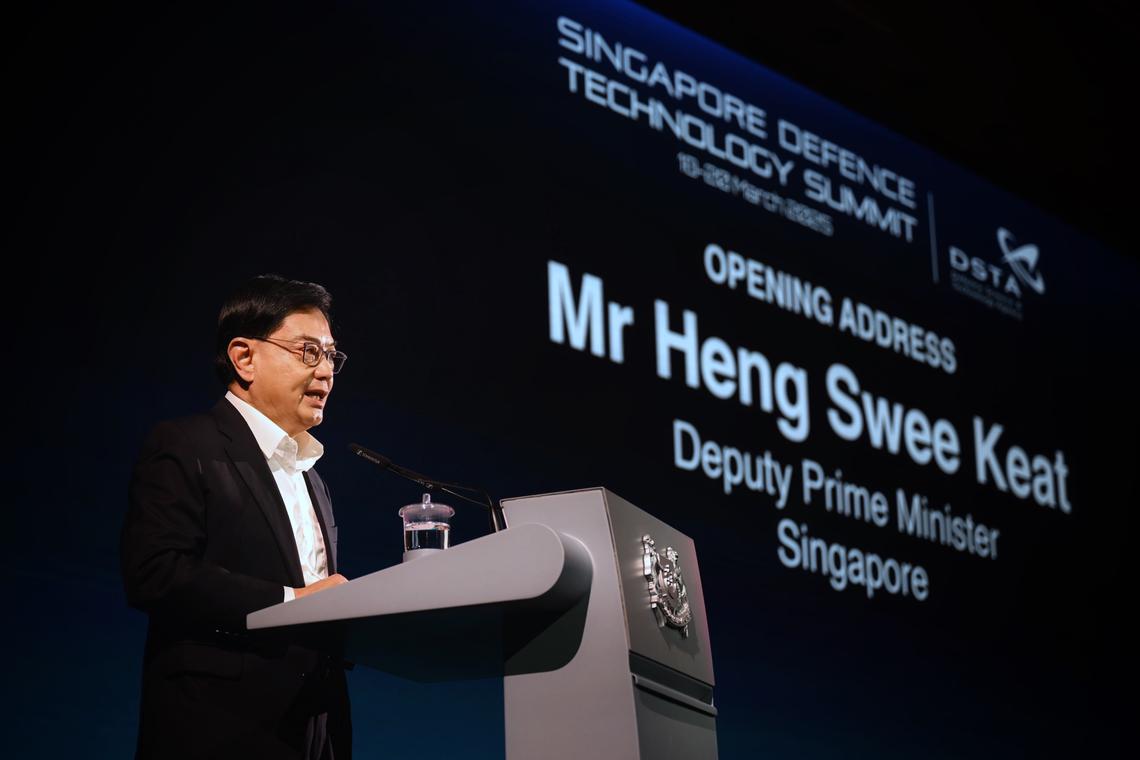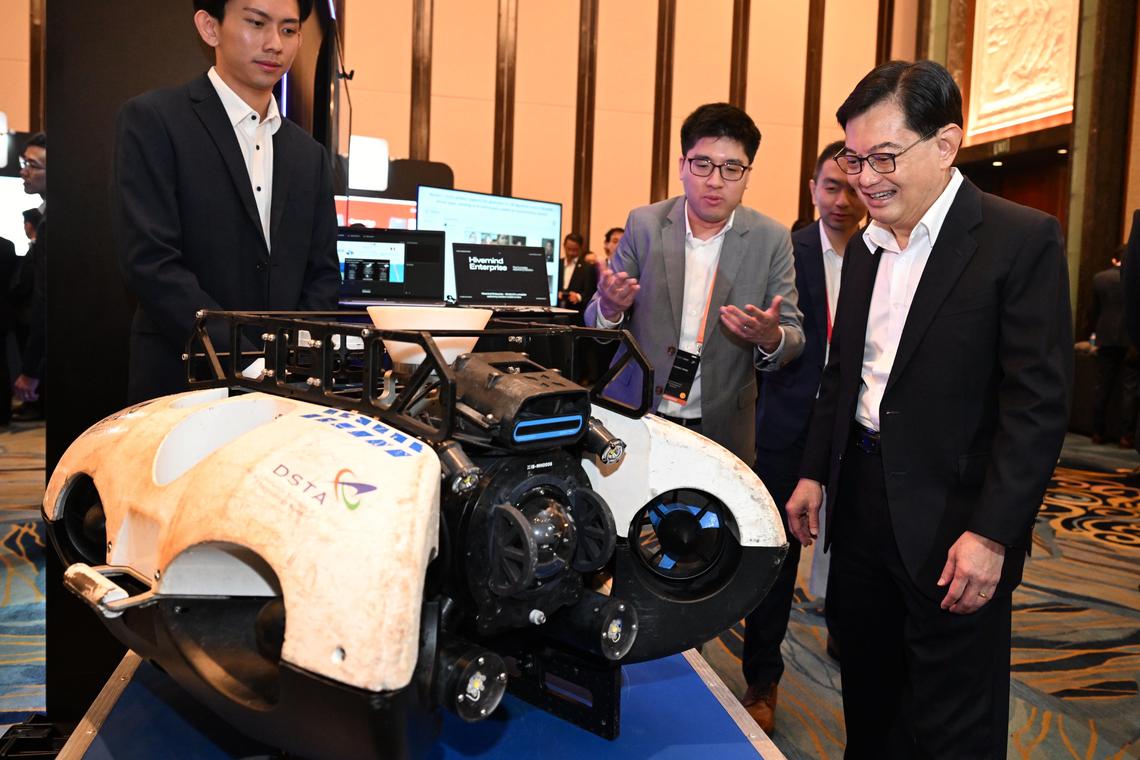SINGAPORE – Singapore will remain steadfast in its commitment to facilitating innovations and partnerships so as to advance global security, Deputy Prime Minister Heng Swee Keat said on March 19.
In a keynote speech at the Singapore Defence Technology Summit (SDTS), he laid out the nation’s approach to technological development at a time when emerging fields such as artificial intelligence (AI) and quantum technologies offer both unprecedented opportunities and risks in areas such as defence.
DPM Heng said the accelerated pace of technological advancement has irrevocably reshaped the security environment, given the rise of asymmetric threats enabled by dual-use technologies.
For instance, innovations meant for civilian use can also serve disruptive military purposes, such as cyber attacks that target critical infrastructure, AI-enabled disinformation campaigns, and the use of autonomous systems in contested environments, he noted.
Such tech advances have taken place in parallel with an increasingly complex global geopolitical landscape, where strategic competition between superpowers has become more pronounced and technology itself more contested.
Nationalism in tech development, such as protectionist policies and tighter export controls, has also raised critical questions about the long-term sustainability of global technological progress, DPM Heng added.
In this environment, Singapore is committed to unlocking the power of emerging technologies, while safeguarding trust and security, he said at the biennial summit – which is organised by the Defence Science and Technology Agency and held at Shangri-La Hotel.
This is as progress in exploiting technological advancements will create new possibilities across multiple domains – from the digital economy to national security – and ensure that Singapore remains competitive and secure, said DPM Heng, who is also the chairman of the National Research Foundation.
He cited how AI developments have led to a paradigm shift in the field of defence, where drones and AI-powered cyber-security systems have led to enhanced situational awareness and enabled faster, more informed responses to threats.
He said another key growth area is quantum computing, which has the potential to perform complex calculations 100 million times faster than conventional computers.
DPM Heng noted that Singapore has invested more than $500 million in research and development into AI since the country’s inaugural AI strategy was launched in 2019, and that the Republic is working on its Research, Innovation and Enterprise 2030 plan to enhance applied AI research and use in sectors such as healthcare, finance, education and transport.
But such tech can also be used to erode trust and disrupt societies, for instance, by rapidly spreading misinformation through AI-generated content.
Quantum, for instance, promises to further turbocharge generative AI capabilities, but is also likely to render current cyber defences obsolete.

DPM Heng cited how AI developments have led to a paradigm shift in the field of defence.ST PHOTO: CHONG JUN LIANG
That is why Singapore is taking proactive steps in addressing such challenges through governance frameworks, responsible innovations and international collaboration, he said.
One such step is the AI Assurance pilot launched by the Infocomm Media Development Authority in February.
It will serve as a test bed to conduct technical testing for the deployment of generative AI applications in areas such as healthcare and finance.
Singapore recently amended its cyber-security laws to strengthen the protection of its critical information infrastructure, which includes both public and private-sector digital assets critical to national resilience, DPM Heng said.
The changes that Parliament passed in May 2024 included mandatory reporting of cyber-security outages and attacks on designated critical information infrastructure or its supply chains, as well as expanded oversight powers for the Cyber Security Agency of Singapore (CSA).
In 2025, CSA will also unveil guidelines to help businesses transition to quantum-safe systems, thereby ensuring that the Republic’s digital defences evolve in step with emerging threats, he added.
“By building trust in technology and mitigating risks, we can ensure that innovation remains a force for progress while safeguarding the security and stability of both civilian and defence ecosystems,” DPM Heng said.
Singapore will also work with international partners to shape governance frameworks and promote responsible tech development so that technology does not become a tool for exploitation and conflict, he added.
He noted that Singapore co-hosted the second Responsible AI in the Military Domain Summit in 2024 which brought together global leaders, experts and stakeholders to discuss military AI governance and ensure tech advances were aligned with global security norms.
The Republic also recently co-sponsored a UN General Assembly Resolution on military AI that supported international efforts to strengthen norms for the safe, ethical and transparent use of AI in defence, he added.
DPM Heng also highlighted platforms such as SDTS and the Shangri-La Dialogue as useful multilateral forums for dialogues and fostering partnerships across governments, industries and academia.
The 2025 SDTS brought together more than 40 speakers from 14 countries to discuss the most pertinent challenges facing the global defence technology sector.

DPM Heng (right) looking at a hovering autonomous underwater vehicle at SDTS.ST PHOTO: CHONG JUN LIANG
Additionally, Singapore will foster public-private partnership to develop a resilient dual-use innovation ecosystem, DPM Heng said.
To this end, economic agencies here are launching Stage One, a new platform to connect local and global start-ups in defence and emerging technologies with industry leaders.
To support this push, DPM Heng said, the Government provided a $440 million top-up to the Startup SG Equity Scheme in 2024 to catalyse venture capital investment in deep-tech start-ups in fields such as quantum tech and space.
Close to $3 billion has been invested in more than 330 start-ups under the scheme so far, he added.
At the heart of these efforts is a fundamental principle: that technology must serve the common good, DPM Heng said.
“A shared vision – where technology not only enhances the readiness of national defence capabilities, but also reinforces peace and stability – is crucial for shaping the future,” he said.
“The choices we make today, the partnerships we build, and the governance frameworks we establish will define how technology impacts global security for generations to come.”
Join ST’s WhatsApp Channel and get the latest news and must-reads.









